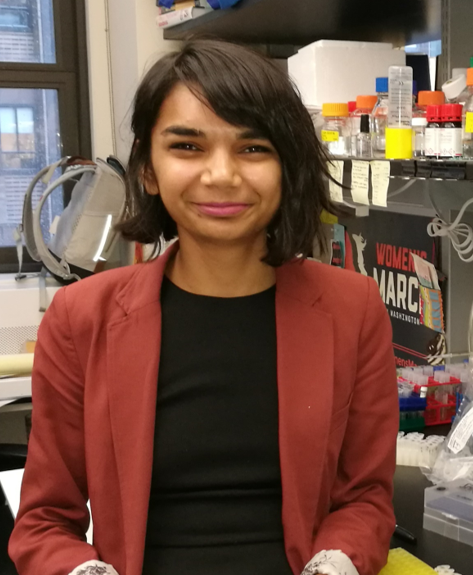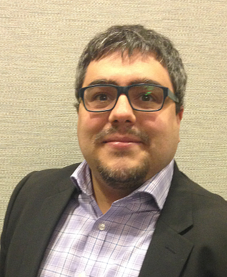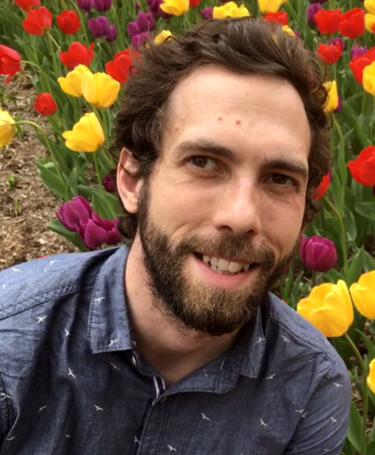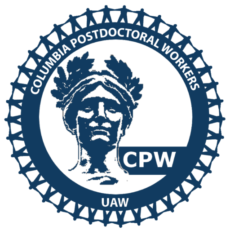 Melissa McKenzie is a Postdoctoral Research Scientist in the Department of Pathology and Cell Biology
Melissa McKenzie is a Postdoctoral Research Scientist in the Department of Pathology and Cell BiologyI am a third year post-doctoral research scientist in Pathology and Cell Biology at Columbia Medical center. I love being a post-doc, and I have enjoyed getting to know many members of this vibrant community over the last few years. I believe in this place and I think it can be more. As a single parent, I have faced many challenges that are best faced together and have worked to help expand and build the parenting community here at Columbia. I am exceptionally lucky in that my PI is generous, flexible and understanding. As I have met more and more of my colleagues, I have learned this is not always the case. This is part of why I feel strongly about unionization. I believe we have an opportunity to build on the efforts of our university senate and professional organizations, and now, with the union, to speak to the university with a stronger united voice. I am running for the bargaining committee because I am optimistic that we can work with the Columbia administration to negotiate a contract that will guarantee and protect fair and equitable working conditions for all of us, regardless of who our PIs are, our immigration status, or through what mechanism we are funded. I will work to increase our access to things that matter to all of us: consistent and reasonable pay increases, access to affordable housing, protections for parental leave and other basic benefits. I will advocate for more accountability and protections in the face of bad actors and workplace harassment. Most of all, I promise to listen to you and work cooperatively with the other members of the committee and the administration to negotiate a contract that reflects our highest hopes for what working at a world-class institution like Columbia should be.
 Medini Annavajhala is a Postdoctoral Research Scientist in the Department of Medicine – Infectious Diseases
Medini Annavajhala is a Postdoctoral Research Scientist in the Department of Medicine – Infectious DiseasesOver the past six years, I have gotten to know Columbia quite well – first as a graduate worker in Environmental Engineering and now as a Postdoctoral Research Scientist in the Medicine Department. I chose to stay here for a postdoc because I love the work I do and the people I work with. Immediately, though, I began hearing from postdocs and Associate Research Scientists about how many felt resigned to not having a voice in any decisions regarding their pay and benefits, grievance procedures, and feeling valued as an academic employee. During my 4 years as an organizer for the Graduate Workers of Columbia and now the Columbia Postdoctoral Workers (CPW), though, the stories I have heard and the workers I have met have given me hope. Standing together as a unit will show the administration of Columbia what is important to us and what we need in order to be productive, healthy, and motivated workers, much of which does resonate across titles and experience levels. A few issues that I personally feel strongly about include: fair pay covering rising living costs (scaling NIH recommended minimums based on cost-of-living indices for NYC), adequate health resources (physical AND mental), and protections for workers filing sexual harassment or unfair labor practice claims to ensure their protection from retaliation. I would be honored to represent CPW by serving on the Bargaining Committee because I truly believe that negotiation with university administration on an even, legally-backed standing is the best way to serve our needs.
 Steven Cook is an Postdoctoral Research Fellow in the Department of Biological Sciences
Steven Cook is an Postdoctoral Research Fellow in the Department of Biological SciencesMy name is Steven Cook, and I am a second-year Postdoctoral Research Fellow in the Department of Biological Sciences. I have been involved with union organizing and the organizing committee for the Columbia Postdoctoral Workers (CPW-UAW) for almost my entire time at Columbia. Having grown up in a union household, and previously a member of SEIU 1199, I have a long-standing interest in unionization and workers’ rights. I strongly believe that by showing collective power through CPW-UAW at Columbia, we can help to improve the working conditions for all postdocs and Associate Research Scientists/Scholars (ARSes) at Columbia.
I have spoken to hundreds of postdocs and ARSes across Columbia’s campuses, I have worked to understand the issues that need to be addressed to create a transparent contract that benefits all CPW-UAW members. There is a clear need to improve the economic (Wages, healthcare, appointment length, visa support, etc.) and non-economic (Sexual harassment, discrimination, career development, etc.) benefits offered by Columbia.
We are not alone in our fight to improve workers’ rights, both here at Columbia, and nationally. I will work my hardest to represent the interests of all CPW-UAW members, and to directly empower our postdoc/ARS workforce.
I have spoken to hundreds of postdocs and ARSes across Columbia’s campuses, I have worked to understand the issues that need to be addressed to create a transparent contract that benefits all CPW-UAW members. There is a clear need to improve the economic (Wages, healthcare, appointment length, visa support, etc.) and non-economic (Sexual harassment, discrimination, career development, etc.) benefits offered by Columbia.
We are not alone in our fight to improve workers’ rights, both here at Columbia, and nationally. I will work my hardest to represent the interests of all CPW-UAW members, and to directly empower our postdoc/ARS workforce.
 Tulsi Patel is Postdoctoral Research Fellow in the Department of Pathology and Cellular Biology
Tulsi Patel is Postdoctoral Research Fellow in the Department of Pathology and Cellular BiologyI started at Columbia as a Ph.D. student in Genetics and Development and am now a 3rd year Postdoctoral Research Fellow in Pathology and Cell Biology. I have been an organizer for both the graduate workers’ unionization campaign and the postdoctoral campaign over the past 4 years. Additionally, I have moderated town halls and served as a witness for our union at the NLRB when the administration tried to argue that ‘postdocs are not employees’ and fellows are ‘outside contractors’. I am enthusiastic about unionization because collective bargaining seems to be the only effective way to hold powerful employers accountable to their employees, and because solidarity with the growing higher-ed unionization movement has the potential to give scientists a voice in the national political conversation. I am running for the bargaining committee because I am excited to contribute to the negotiation of a fair contract for all postdocs and ARSs. The Columbia administration has consistently shortchanged postdocs in
several ways: by not guaranteeing pay increases that match our experience or even the increasing cost of living in NYC, by providing us inconsistent and unaffordable housing, by taking away benefits when we receive fellowships, by not guaranteeing consistent parental leave and childcare benefits, by ineffectively resolving cases of sexual and other workplace harassment. I will do my utmost to negotiate a contract that guarantees us these basic rights. I will also continue to organize and moderate open town halls to better understand our bargaining priorities and keep the bargaining process transparent.
several ways: by not guaranteeing pay increases that match our experience or even the increasing cost of living in NYC, by providing us inconsistent and unaffordable housing, by taking away benefits when we receive fellowships, by not guaranteeing consistent parental leave and childcare benefits, by ineffectively resolving cases of sexual and other workplace harassment. I will do my utmost to negotiate a contract that guarantees us these basic rights. I will also continue to organize and moderate open town halls to better understand our bargaining priorities and keep the bargaining process transparent.
 Andrew Zaharia is a Postdoctoral Research Scientist in Zuckerman Institute
Andrew Zaharia is a Postdoctoral Research Scientist in Zuckerman InstituteI’m a third-year postdoc in cognitive neuroscience in my first year at Columbia. I got involved with the union because I believe that better working conditions for postdocs and ARSs would be better for science and academia as a whole. All postdocs and ARSs deserve a living wage, more affordable health care and child care, and retirement benefits. The less we have to worry about having basic needs met, the better we can retain talent and focus on research.
I’ve talked to postdocs and ARSs in every lab at Manhattanville to learn more about their experiences and priorities. I worked hard to turn out the union vote, calling workers, participating in town halls, and speaking publicly in support of the union. Most recently, I organized and facilitated the union’s first town hall on the Manhattanville campus.
As a member of the bargaining committee, I would take consensus building and communication with the rest of the union very seriously. As we develop and discuss our bargaining goals, you can expect detailed presentations from me about the bargaining committee’s research and analyses. And since data visualization is one of my research interests, you can expect from me sweet (and informative) plots.
The union serves as a check on Columbia’s power and gives us all a voice that Columbia can’t ignore. Let’s keep the pressure on the administration and win a strong contract that not only improves our lives, but also sets a new standard for other universities to follow.
I’ve talked to postdocs and ARSs in every lab at Manhattanville to learn more about their experiences and priorities. I worked hard to turn out the union vote, calling workers, participating in town halls, and speaking publicly in support of the union. Most recently, I organized and facilitated the union’s first town hall on the Manhattanville campus.
As a member of the bargaining committee, I would take consensus building and communication with the rest of the union very seriously. As we develop and discuss our bargaining goals, you can expect detailed presentations from me about the bargaining committee’s research and analyses. And since data visualization is one of my research interests, you can expect from me sweet (and informative) plots.
The union serves as a check on Columbia’s power and gives us all a voice that Columbia can’t ignore. Let’s keep the pressure on the administration and win a strong contract that not only improves our lives, but also sets a new standard for other universities to follow.
 Ignacio Hernandez-Morato is an Associate Research Scientist in the Department of Otolaryngology Head and Neck Surgery
Ignacio Hernandez-Morato is an Associate Research Scientist in the Department of Otolaryngology Head and Neck SurgeryI am an international researcher in Neuroscience focused in the processes involved regarding peripheral nerve regeneration. I defended my thesis in 2012 before I moved to the US. I have been working for more than two years as Associate Research Scientist at Otolaryngology-Head and Neck department in Columbia University Medical Center campus. Since I was predoc I have been participating in several initiatives for improving the academia and the life of the researchers. Here, at Columbia’s I have been collaborating in the formation of the CPW-UAW from the beginning.
I believe we are actually living a very interesting time point of our recent history and I enjoy helping to build a new form of relationship among people in academia. The union must be a vehicle that will switch an evolution for the change of our R&D system in academia. My primary task will be to reflect the concerns that we, the postdoctoral researchers, have as a key player in the expanding of knowledge that Columbia University must carry on.
I believe we are actually living a very interesting time point of our recent history and I enjoy helping to build a new form of relationship among people in academia. The union must be a vehicle that will switch an evolution for the change of our R&D system in academia. My primary task will be to reflect the concerns that we, the postdoctoral researchers, have as a key player in the expanding of knowledge that Columbia University must carry on.
 Jozsef Meszaros is a Postdoctoral Research Scientist in the Department of Psychiatry
Jozsef Meszaros is a Postdoctoral Research Scientist in the Department of PsychiatryI’m a second-year postdoc working at Columbia University Medical Center in the Department of Psychiatry. I have both a law degree from UPenn and a PhD from Columbia in neuroscience. I believe research can be an extremely rewarding endeavor if the conditions are right. Harassment, economic deprivation, and precarious work-life balance arrangements can sour your relationship to Columbia, the academy, and your field. As a member of the bargaining committee, I would focus on continuing to understand the specific needs of all union members, with an emphasis on preventing and eliminating harassment and creating financial and structural support for parents. To attain these objectives, I plan to encourage postdoc attendance at bargaining sessions, with a goal of having at least five new postdocs at each bargaining session. These bargaining sessions can be a transformative experience as postdoctoral union members get a glimpse at the real inner workings of the University. Additionally, I will put my hard-earned law degree to good use by ensuring that the claims of Columbia’s highly-paid lawyers are thoroughly challenged. I believe that my previous experiences with working in law and advocacy, as well as my familiarity with Columbia University and its employees and systems will help me be an effective change-agent for all postdoctoral union members.
 Pierre-Jacques Brun is an Associate Research Scientist in the Department of Medicine – Preventive Medicine
Pierre-Jacques Brun is an Associate Research Scientist in the Department of Medicine – Preventive MedicineI am a fourth-year Associate Research Scientist in the department of Medicine and I have been working at Columbia University for 8 years. Having observed so many problematic situations, I am very sensitive to the power imbalance between a yearly appointed, and on soft money, career starting postdoctoral worker and highly regarded tenured Columbia Professors. Sometimes, this power imbalance is abused and the Columbia University administration has no intent on dealing with it fairly. This is why I am determined to help the postdoc and research scientist union bargain for a contract that offers better protections, a fairer grievance process in cases of sexual harassment and bullying, and better compensation for our hard work. A collectively bargained contract is the only way we can guarantee better protections for ALL postdocs and research scientists. The next few months will be critical and it would be my honor to bring my experience, here at Columbia, and my determination to the bargaining table.

